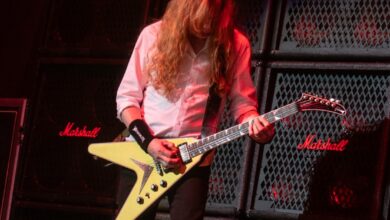“Tears in Heaven” in Las Vegas – Eric Clapton’s Timeless Performance That Still Moves the Soul
In 2019, during an intimate evening in Las Vegas, Eric Clapton took the stage with nothing but his acoustic guitar and a quiet spotlight. The audience, bathed in stillness, watched as he began to play “Tears in Heaven.” There were no elaborate visuals, no flashy lights—just a deeply personal performance from one of music’s most enduring legends. The simplicity of the setting made the emotions behind the song all the more palpable.
Originally written in the early ’90s, “Tears in Heaven” emerged from Clapton’s unimaginable grief following the tragic death of his four-year-old son, Conor. The song, created alongside lyricist Will Jennings, spoke of loss, love, and the aching void left behind. Upon its release in 1992, it struck a powerful chord with listeners around the world, earning critical acclaim and taking home multiple Grammy Awards, including Song of the Year and Record of the Year.
As the years passed, Clapton’s performances of the song evolved. By the time he performed it in Las Vegas in 2019, his voice had matured, softened with age and experience. His hands, once quick and sharp, now moved with deliberate emotion. The guitar’s melody was gentle, almost whisper-like, as if every note carried a memory. The atmosphere in the room shifted; it wasn’t just a concert anymore—it was a shared experience of vulnerability and remembrance.
Clapton didn’t speak much before or after the song. He let the music say what words could not. Every lyric floated gently into the air, filled with a kind of sorrow only time can teach. For those who knew the story behind it, the performance felt like a quiet honoring of a wound that never fully heals. And for those hearing it for the first time, it became a powerful entry point into the depth of Clapton’s artistry.
There was something haunting in the way he delivered the lines—something deeper than sadness, something closer to acceptance. The performance reminded everyone present that even after decades, grief doesn’t disappear; it simply finds a place to live inside us. That night, Clapton didn’t just sing to the crowd—he sang to his son, to himself, and to every person who has ever lost someone they love.
For fans in attendance, it felt like being part of a sacred moment. And for those watching online, the video captures the essence of Clapton’s legacy—not as a guitar god or rock star, but as a father, a man, a storyteller using melody to express what speech cannot. The performance lives on, not just as a video clip, but as a reminder of the healing that music can offer.
The contrast between the delicate guitar work and the weight of the lyrics added to the emotional gravity. Each verse carried with it a deep sense of longing, and as Clapton sang, he allowed his vulnerability to shine through completely. In that quiet room, his music did more than entertain—it offered a space for reflection, mourning, and perhaps even a touch of healing.
What made this performance stand out wasn’t just Clapton’s technical skill or the fame of the song—it was the courage it took to return to something so deeply personal, so publicly. Many artists shy away from their most painful material over time. But Clapton embraced it once more, not out of obligation, but as a form of connection—between himself and the crowd, between memory and melody.
For those who’ve experienced profound loss, the performance served as both comfort and catharsis. There was no grand finale, no dramatic pause—just a quiet ending that hung in the air, as if even silence had weight. It was more than a concert moment; it was the kind of experience that lingers, that returns in quiet moments when music is needed most.
Eric Clapton’s 2019 performance of “Tears in Heaven” in Las Vegas is a testament to music’s ability to speak across time and emotion. It reminds us that behind every song is a story, and behind every legend is a human heart still learning to carry love, loss, and the beauty of both. This is not just a song—it’s a prayer, a memory, and a gift that continues to echo in the hearts of those who hear it.





